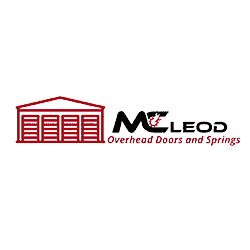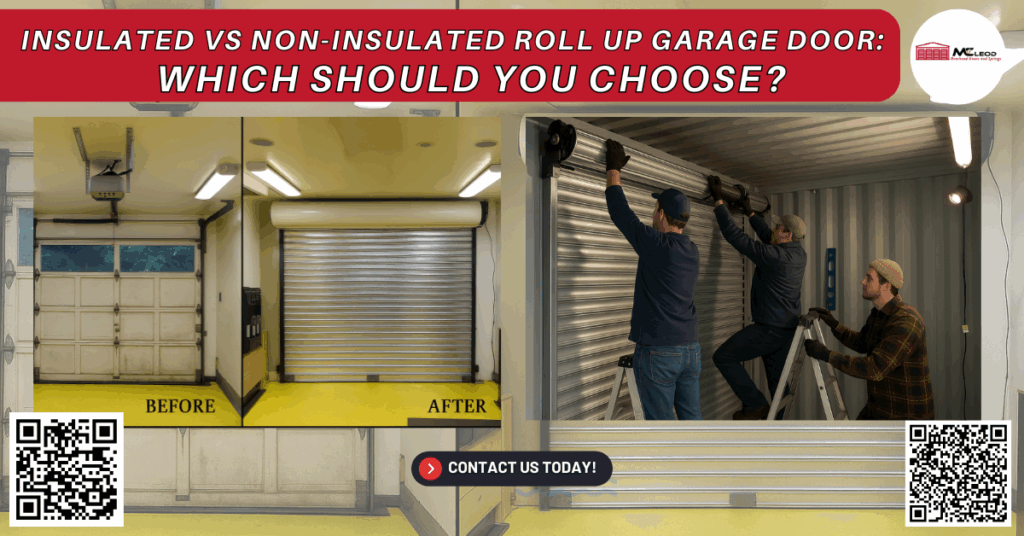In Baytown, TX, where the heat can be intense and coastal winds unforgiving, choosing the right roll-up garage door isn’t just about style, it’s about performance, durability, and cost-efficiency. At McLeod Overhead Doors and Springs, we recently worked with a warehouse near I-10 that faced structural and temperature-related issues due to an old, non-insulated rolling sheet door. Our team upgraded it to an insulated, wind-rated steel roll-up door, built to meet Florida Building Code standards and equipped with cam-action devices and chain hoist operation. The result? Improved energy efficiency, quieter operation, and compliance with updated safety codes all within two weeks of the initial site check.
According to recent studies, garages with non-insulated doors lose up to 25% more heat in winter and absorb 30% more in summer. In commercial or residential field applications, that’s a major hit to comfort, performance, and energy bills. If your building or home features attached garages, insulation isn’t a luxury, it’s a necessity.
Whether you’re selecting a garage door model for a new construction site or replacing a dated unit with a certified wind load series built for heavy-duty commercial use, understanding the differences between insulated and non-insulated roll-up doors is critical. Let’s explore your best options, taking durability, building codes, installation timelines, cost, and more into account.
What is a Roll-Up Garage Door?
A roll-up garage door, sometimes referred to as a rolling sheet door or slat door, is a space-saving, vertically operating garage door often made from steel sheets or interlocking slats. These doors roll into a coil above the opening when lifted, making them ideal for locations with limited headroom or space.
These doors are available in various models, colors, and sizes, suitable for everything from light-duty sheds to heavy-duty commercial buildings. Whether you’re considering a Janus model with polyester paint or an Amarr model with enhanced wind load ratings, there is a wide range of options available to match your structural needs and style preferences.
Some standard types include:
- Non-insulated rolling sheet doors: Basic, single-sheet steel doors for minimal insulation and protection.
- Insulated roll-up garage doors: Feature layers of galvanized steel, insulation (like polyurethane or polystyrene), and a durable interior backing for enhanced thermal and acoustic performance.
- High-performance models: Used for demanding industrial or commercial applications, with added environmental control and wind resistance.
Benefits of an Insulated Roll-Up Garage Door
1. Superior Temperature Regulation
Insulated roll-up garage doors significantly reduce heat transfer, thanks to the insulation layer placed between two durable steel sheets. This feature is critical for residential and commercial applications in regions like Baytown, where summers are scorching and humidity levels are high. The insulation also acts as a buffer against sudden cold fronts during winter months, making your garage or workspace more comfortable year-round.
2. Increased Energy Efficiency
Whether you’re cooling your warehouse with fans or running HVAC in your home garage, a poorly insulated garage door model can spike your energy bills. Insulated roll-up doors improve environmental controls, keeping conditioned air inside and preventing the outdoor heat or cold from seeping in. Over a year, the cost savings from reduced energy use can be substantial, especially in buildings with large square footage.
3. Enhanced Noise Control
Garage doors with insulation panels offer much-needed noise reduction, whether it’s to muffle nearby traffic or create a quieter workspace. In homes with attached garages, this can dramatically reduce noise inside the living area. Commercial clients also benefit from this feature in busy warehouse zones.
4. Durability and Structural Integrity
Insulated roll-up doors, built with heavy-duty steel panels and designed for higher wind load resistance, are far more resilient against dents, corrosion, and environmental wear and tear. Many come with up to a 10-year warranty, ensuring long-term performance under tough field applications. These doors are built to meet international and Florida building code standards, offering peace of mind for both residential and commercial users.
5. Versatility in Design and Features
Insulated garage doors come with various color options, window inserts, chain hoist systems, and cam-action locking devices. Whether you’re interested in Amarr’s decorative series or Janus’s commercial-grade doors, features like durable polyester finishes, impact-rated windows, and quick installation kits allow for full customization.
Benefits of a Non-Insulated Roll-Up Garage Door
1. Lower Upfront Cost
For smaller garages, storage sheds, or agricultural buildings where insulation isn’t a concern, non-insulated roll-up doors provide a budget-friendly solution. These economical alternatives are typically lighter and cheaper to install, especially when large-scale site installations involve multiple units.
2. Simpler Installation Process
Due to their single-layer design, non-insulated roll-up garage doors are often easier to install, requiring fewer materials and man-hours. This results in quicker turnaround times, sometimes within just a few business days, especially when a site check confirms minimal prep is needed.
3. Suitable for Low-Traffic or Detached Spaces
Non-insulated doors are ideal for light-duty applications such as detached garages, barns, or storage units that aren’t regularly climate-controlled. If your space is not connected to your primary home or business and doesn’t store sensitive materials, insulation may not be necessary.
4. Lightweight Operation
With fewer materials, these models are easier to lift manually or through basic chain-operated systems. For users concerned with long-term motor wear or looking for a light-duty chain hoist option, non-insulated models offer smoother, lower-resistance operation.
Comparing Insulated vs. Non-Insulated Roll-Up Garage Doors
| Feature | Insulated Roll-Up Door | Non-Insulated Roll-Up Door |
| Thermal Performance | High — Suitable for climate control and environmental control | Low — Minimal insulation, temperature fluctuates |
| Noise Reduction | Excellent soundproofing capabilities | Minimal noise dampening |
| Wind Load Certification | Certified for higher load — meets stringent building codes | May lack wind resistance ratings |
| Panel Strength | Multiple steel layers + foam core | Single layer of steel or aluminum |
| Energy Efficiency | Excellent — Reduces heating/cooling costs | Inefficient for connected or climate-controlled spaces |
| Cost | Higher upfront, more savings long-term | Lower upfront, fewer performance benefits |
| Recommended Use | Homes, commercial buildings, and attached garages | Sheds, barns, storage units, detached garages |
| Durability | Withstands wind, impacts, rust, and wear | More prone to dents, corrosion, and environmental damage |
Factors to Consider Before Choosing
1. Climate and Environmental Exposure
If your building is in a high-wind area, exposed to direct sun or humidity, or subject to local building codes, insulated doors with certified wind load resistance are your best bet.
2. Garage Usage and Layout
Do you use your garage for working, exercising, or as a temperature-sensitive workspace? Then, insulation, safety latches, and chain hoist operation should all be on your checklist. For basic storage use, a non-insulated sheet door model may be adequate.
3. Budget and Long-Term Goals
Though insulated models have a higher initial price, their year-round cost savings, reduced maintenance needs, and increased durability make them more economical over time. Remember to check warranty lengths, insulated models often come with longer guarantees.
4. Size and Product Options
Whether you need a 10×10 door for your metal shed or a 12×14 certified commercial roll door, there are options to fit every application. Be sure to explore all available panels, sizes, and colors to match your garage or business structure.
How Can McLeod Overhead Doors and Springs Help You?
At McLeod Overhead Doors and Springs, we specialize in providing garage door installation, repair, and maintenance services tailored to your needs. Whether you need a heavy-duty insulated roll-up door for your commercial building or a cost-effective solution for your storage shed, our trained technicians are ready to help.
We offer:
- Quick installation for all door models and sizes
- Free site check and product recommendations
- Amarr and Janus model features certified wind load ratings
- Garage door maintenance packages and safety inspections
- Wide range of colors, sizes, and slat options
- Expert service for residential and commercial field applications
📍 Visit Us: 8820n N Hwy 146, Baytown, TX 77520
📞 Call Now: (281) 603-2885
Don’t settle for a one-size-fits-all solution. Let us help you choose the perfect roll-up garage door that meets your standards, codes, budget, and style. Contact McLeod Overhead Doors and Springs today and get your installation scheduled in no time!
Frequently Asked Questions (FAQs)
Q1: How long does it take to install a roll-up garage door?
Most installations take 1–2 days, depending on the door size, model, and site conditions.
Q2: Can roll-up doors be painted or customized to match my building?
Yes, many models come in a variety of factory-applied color options or can be painted with approved coatings.
Q3: Are there roll-up garage door models suitable for hurricane-prone areas?
Yes, we offer certified wind load doors that meet or exceed Florida and international building code standards.
Q4: What maintenance is required for roll-up doors?
Annual inspections, lubricating moving parts, checking chain tension, and inspecting weather seals help extend the life of your door.

